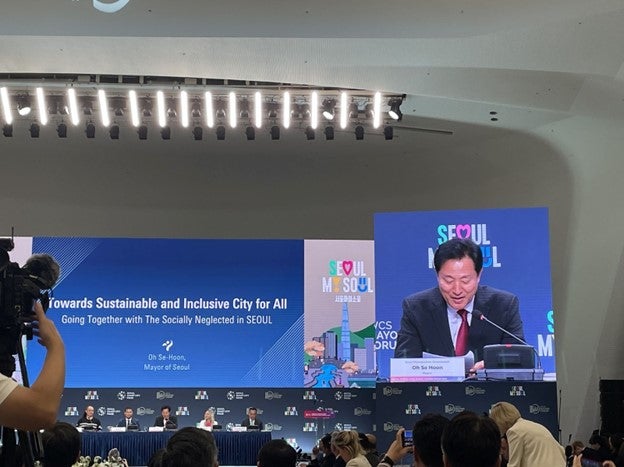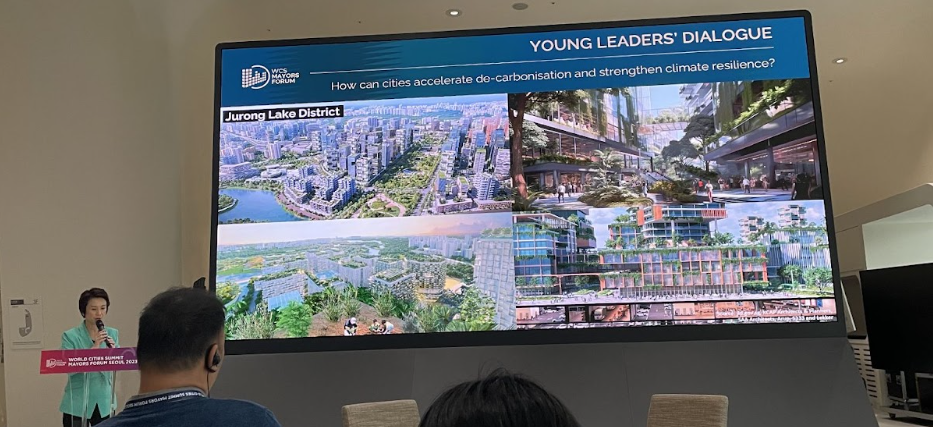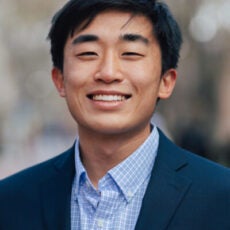
Decarbonizing Cities: Singapore Announces Sustainable Policies at the World Cities Summit in Seoul
50 mayors from across the world discuss balancing sustainability and inclusivity goals for their cities. Explore Singapore’s innovative commitments to achieve these objectives.
A few weeks ago, I had the opportunity to attend the Seoul World Cities Summit Mayors Forum through a generous grant provided by the Kleinman Center. The main event consisted of mayors engaging in a round-table discussion of the latest climate policy advancements within their cities. There were many academic, governmental, and professional experts that contributed to the discussion, including those from the World Bank, McKinsey, and various universities. The Summit was sponsored by the Singapore Centre for Liveable Cities, a government-run urbanist think tank, and Singapore’s Urban Redevelopment Authority.

As a member of the Young Leader delegation, I and 25 others were privileged to talk directly with Ms. Low Yen Ling, a Singaporean politician and urban sustainability leader, who described the city-state’s many plans and efforts to become net-zero by 2050. For me, this was not a particularly impressive statement—after all, the US and many other countries have outlined similar goals and intentions—but the other participants from Singapore told me otherwise.
“We are not like other countries: we do things we say we will, and say them when we know we can,” said one Singaporean participant. Below, I outline the country’s efforts to become a more green and livable city, and how these ideas will be applied in their new Jurong Lake District.
Smart and Sustainable Singapore
Singapore is frequently cited as a model city for great urban planning practices, and they have paired a well-run system of land management and development with a strong commitment to environmental sustainability. Even though Singapore is the second densest city in the world, 50% of the city is made up of green space, such as parks and gardens, and recently ranked first in the Sustainably Led Cities Index. Current greening efforts are spearheaded by the Singapore Green Plan 2030, which includes goals such as:
- Retrofitting 80% of existing buildings to be Green Mark certified;
- Building 80% of new buildings to be super low energy (SLE) certified;
- Planting 1 million trees; and
- Mandating 100% of newly registered cars to be electric or hybrid models.
These goals are all meant to be achieved by 2030.
Singapore is also working to ensure growth is inclusive and people-centered as well as sustainable. Deliberate policy decisions in past decades have led to 90% of Singaporeans owning their homes, mostly through public housing; this is a stunning achievement, especially considering the high price of land in the city. New investments into public transport, sidewalks, bike infrastructure, and walkable neighborhoods aim to reduce citizen’s dependency on cars, which is also good for the environment.
Jurong Lake District

All of these goals converge within Singapore’s plan for a new business district at Jurong Lake. Conceived to rival the size and influence of downtown, planners hope that the new district will alleviate congestion and encourage multi-modal growth within the city. Jurong is built to be no less than an urbanist paradise: neighborhoods embody the “live, work, play” philosophy that leads to vibrant, mixed-use blocks built around easily accessible transit options.
Jurong Lake also places a central focus on environmental sustainability. Buildings will incorporate vertical and rooftop greenery to replace trees lost during development, and a “central spine” of green space running through the district will combat the urban heat island effect (as well as lead to a more pleasant landscape). 85% of travel within the district will be walking, cycling, or public transport (served by fully electric buses) by 2035. The government is also planning for Jurong to become a green tech and finance hub, attracting businesses and experimenting with the latest technology, such as autonomous vehicles.
Singapore has backed up their sustainability goals with a series of robust policies encouraging green growth and innovation. While it may be difficult for other countries to replicate Singapore’s commitment— probably due to lack of financing or political will— we can appreciate their status as a green pioneer and incrementally integrate their best policies into our own climate playbook.
Joey Jung
Urban Studies and Political Science, SASJoey Jung is a student majoring in Urban Studies and Political Science. He is primarily interested in community development, public policy, and urban planning. He is a Penn IUR Urban Fellow, Andrew Mitchell Center Fellow, former president of the Wharton Undergraduates in Public Policy.

